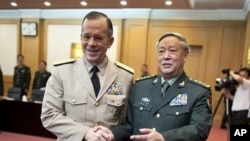The top military commanders from the United States and China have held what they call "candid" talks in the Chinese capital, Beijing, about territorial disputes in the South China Sea and other contentious issues.
Talks between US Admiral Mike Mullen and his Chinese counterpart Chen Bingde were meant to improve relations after setbacks because of U.S. arms sales to Taiwan, cyber attacks traced to China and tensions in the South China Sea.
But if their comments at a Beijing news conference Monday were any indication, those tensions remain. General Chen condemned recent joint military exercises between the United States and two countries that are in the midst of tense maritime disputes with China.
|
VOA's Ira Mellman speaks with Dean Cheng, a research Fellow for Political and Security Affairs at Washington's Heritage Foundation, about Admiral Mullen's vsit to China. |
Chen says although the United States says it is not willing to intervene in the disputes over the oil and gas-rich South China Sea, it is sending the opposite signal to the world through its military drills with Vietnam and the Philippines. He admits the US has done it before, but says it is extremely inappropriate to do it at this particular time.
Admiral Mullen responded, saying the United States would continue to conduct military exercises with its allies in the region.
"The United States has had its presence in the Asian and Pacific Regions for decades and we've exercised with our allies and friends in this part of the world for decades and we will continue to do that," Mullen said.
The admiral said after his arrival in Beijing Sunday the United States is, and will remain, a Pacific power. But Mullen said the regional and global challenges facing the U.S. and China are too large and too vital to be blocked by misunderstandings.
China, the Philippines, Vietnam, Malaysia, Brunei and Taiwan all claim territory in the South China Sea, with most of those claims centered on the potentially energy rich Paracel and Spratly island chains. China's claim is the largest and it has issued sharp warnings in recent weeks, including threats of military action, to enforce its claims.
The talks also failed to resolve differences over American air reconnaissance flights near China's coasts.
Chen said some of the flights have come within 25 kilometers of China's border and urged the United States to consider the feelings of the Chinese people and the military leadership.
Mullen said the flights are conducted in accordance with international norms. He said the United States would continue to comply with those standards.
The official Xinhua news agency quoted Chen as saying the two also discussed cyber security, China's military development and the attitude of some U.S. politicians toward China.
Mullen is in Beijing on a four-day visit, the first by a U.S. military chief of staff since 2007. Xinhua quoted Chen saying the two found "a lot of common ground" but had "different opinions on certain issues."
During his visit, Mullen is to visit Chinese military bases outside Beijing. His meetings are also expected to deal with stalled nuclear disarmament talks with North Korea, U.S. arms sales to Taiwan and confidence building measures between China and the United States.




